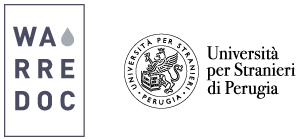Con il supporto ed il patrocinio di
Edition 2019: WINTER SCHOOL DATA RICH HYDROLOGY
organized by:
Consorzio interuniversitario per l’idrologia CINID
UNESCO World Water Assessment Program WWAP
Università per Stranieri di Perugia WARREDOC
Colombella (Perugia, Italy), 28 January – 1 February, 2019
Background and Goals
The past century hydrological sciences developed, among the other Earth Sciences sectors, as a data poor scientific discipline. In the 70’s, 80’ and 90’s hydrologists and water resource management professionals struggled with lack of data, data limitations due to the spatial and temporal scale and significant inaccuracies and data voids in hydrological time series and spatial layers. As a matter of fact, hydrologists developed geospatial and numerical interpolation, extrapolations and models to address water resource and risk management challenges and issues. At the end of the century the situation abruptly changed with the Earth Observation (EO) of the water cycle and land morphology from space. Advanced data processing and distribution systems that were implemented at the beginning of the new century easily and freely provided continuous high resolution topographical and environmental data. This was a turning point for hydrology, with the advent of terrain analysis and spatially distributed models that were finally feeded by spatially continuous data on water morphology and hydrologic processes. In less than 20 years, remote sensing and ground monitoring systems have transformed the way hydrologists work with an exponential increase of data temporal, spatial scale and resolution. We now live in a data rich world, with public and private satellites, Lidar, drones and ground radars that provide unlimited opportunities and data to hydrologists for understanding, monitoring, modeling and interpreting watershed physical processes, features and water-human interactions in complex urban ecosystems. Moreover, Internet of Things (IoT), video cams and environmental low cost sensors are now increasingly available providing information not only on natural and urban hydrologic system dynamics, but also on human behavior, risk perception and societal dynamics related to human needs (i.e. water-food-energy nexus), natural disasters and water stress. Citizens are not only just passive users, but they dynamically interact, sending and receiving information in real time, becoming human sensors of the real world. As a result, while hydrology is transforming with “New data”, Big Data and Data/Citizen science, it seems that it has become more and more important to make sure that the quest for hyper-resolution global water modeling, does not neglect the importance of proper understanding and representation of hydrological and meteorological processes in complex multi-disciplinary earth science research and projects. General goal of this Winter School is to guide participants in understanding and learning the theory, data, methods and tools by means of lectures and hands on for an extensive and immersive introduction to most recent findings of hydrological sciences. At the end of the School students will catch the opportunities of the “Data Rich Hydrology” era we live in, while learning the importance of understanding the knowledge gaps and scientific advancements related to hydrological process mechanics and evolving watershed features.
AGENDA
Lunedì 28 Gennaio
Sessione mattutina
Institutional welcome remarks Dianella Gambini (Università per Stranieri di Perugia), Lucio Caporizzi (Regione Umbria), Stefano Bigaroni (Umbria Digitale), Fabio Castelli (CINID) Stefan Uhlenbrook (UNESCO WWAP)
Pop-up short talks & Open Discussion on “New Data in Hydrology” with the contribution also of I. Becchi, P. Claps, R. Rosso, G. Roth, F. Siccardi, L. Ubertini
Rafael L. Bras, The Era of Data Rich Hydrology
Stefan Uhlenbrook, The WWDR and SDG 6 Synthesis Report
Sessione pomeridiana
Aldo Fiori, Groundwater hydrology and hydrological process mechanics
Marco Marani, Beyond traditional extreme value theory: lessons learned from rainfall and hurricane intensity
Maria Cristina Rulli, The water-food-energy nexus
Martedì 29 Gennaio
Sessione mattutina
Rafael L. Bras, The Era of Data Rich Hydrology
Stefan Uhlenbrook, The WWDR and SDG 6 Synthesis Report
Fabio Castelli, Remote sensing and data assimilation in hydrology
Sessione pomeridiana
Roberto Deidda, Modelling scaling properties of precipitation fields
Salvatore Grimaldi, Hydrologic measurements and novel observation technologies
— Dinner & Social event —
Mercoledì 30 Gennaio
Sessione mattutina
Salvatore Manfreda, Drones in Hydrology (lecture & hands on)
Elena Volpi, Hydrological risk assessment: Return period and probability of failure
Sessione pomeridiana
Andrea Libertino, Advances in the space-time analysis of rainfall extremes
Riccardo Rigon, Hydrologic modelling in a data rich world
Giovedì 31 Gennaio
Sessione mattutina
Daniele Ganora, Data poor vs. data rich cases for flood hazard (lecture & hands on)
Gabriele Freni, Distributed Data quality and urban flood modelling uncertainty
Sessione pomeridiana
Fernando Nardi, Citizen science and big data in hydrology
— Computer Lab / Practice data and tools —
Venerdì 1 Febbraio
Sessione mattutina
Tommaso Moramarco, Stream flow measurements: ground and satellite observations
Alessio Domeneghetti, Remote sensing data and tools to foster inland water monitoring and flood modeling
Q & A session – Open Discussion
Coffee breaks are organized at mid mornings and afternoons close to the workshop room. Lunch breaks are organized in the Villa La Colombella cafeteria./*54745756836*/

 Italiano
Italiano

